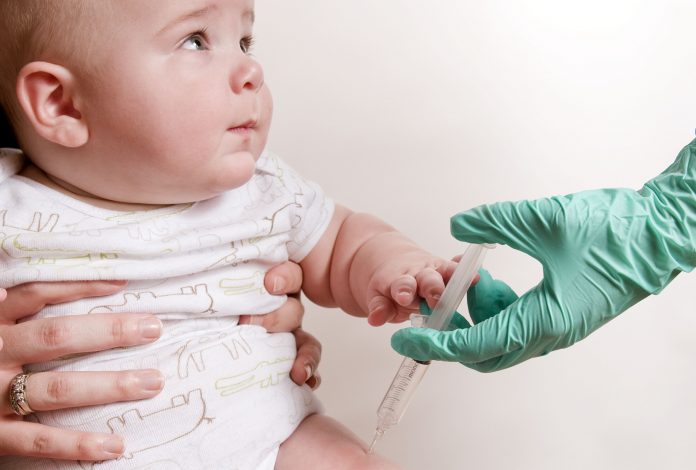Pneumonia is a critical infection in the lungs, that attacks people of all ages. The condition becomes severe in the case of children and older people, as their immune system is not too strong. According to the World Health Organization, every year, beyond 160 million kids suffer from it across the world. The most pathetic condition occurs in children under five years. The disease can be life-threatening for them. Thus, providing the pneumonia vaccine for babies at the right time every year is necessary to fight against the disease.
When the germs of pneumonia reach the lungs, they get filled up with some sort of mucus and become inflamed. Due to the inflammation, and accumulations of air sacs, the affected person, can face difficulties while breathing. As a result of the inhaling problem, sufficient oxygen fails to enter into the blood. Hence, the cells of the body cannot perform well. If you leave this disease in this condition without proper treatment, it may lead to a fatal disease.
Table of Contents
Cause of the disease
A bacteria named Streptococcus pneumonia is mainly responsible for causing the disease. There is another bacterium named Legionella pneumonia, which is responsible for the type of pneumonia known as Legionnaires pneumonia. Apart from the bacteria, some fungi and viruses are also responsible for the disease.
The viruses, bacteria, or fungi that rest in the different parts of your body like the sinuses, noses or mouth or the environment can easily enter into your lungs and develop the pneumonia infection. Or, as it is an airborne disease, you can catch it with the closer contact of the affected person. To avoid its dangerous effects, you must receive all the doses of the pneumonia vaccine.
Another leading reason for developing this disease in adults is the HIB or type B influenza. Aside from that, some other acute respiratory infections may turn into dangerous pneumonia disease.
Other aspects that can be responsible for the disease
1. Smoking
Inhaling tobacco is extremely bad for health; it destroys the lungs and causes several infections in it. Smoking regularly can increase the risk of the disease than those who do not.
2. Poor immunity power
People having a poor immunity system can easily get targeted by the germ of the disease.
3. Chronic disease
Suffering from long term chronic diseases tends to damage the body cells, allowing it to catch diseases easily. In such conditions, anybody can easily be affected by the disease.
What are the symptoms of the disease?
The symptoms of the disease are so severe that the patient may end up needing to take admittance in the hospital. It is for the best to consult a doctor and receive the pneumonia vaccine to prevent the dangerous side effects and the death risks of the disease. If you are down in viral pneumonia, the chances of developing the full symptoms are within 7 days.
The early symptoms of the disease include cold, cough, body ache, fever and weakness. The symptoms upon the newly born babies or the infants may appear later, which makes it difficult to diagnose the disease. Here is the list of the symptoms, that you can notice if, you are developing the disease-
- Excessive coughing and when the affected person discharges, yellow and greenish mucus is visible
- Sometimes the patient spit out blood in mucus
- Severe breathing problem
- Fever and shivering
- Stabbing pain in the chest
- The lower energy level and fatigue
- vomiting and eating disorder
These are the most regularly observed symptoms, though it may vary from one person to another. But, breathing difficulty and blueness in lips are the widely seen symptoms among the patients in the initial stage of the disease.
Is the disease contagious?
Well, it is sure to say that the disease is contagious, but, its contagious period is hard to estimate. The contagion ability in each patient relies upon the type and stage of pneumonia.
After receiving the pneumonia vaccine, the chances of getting the disease through the contact of the affected patient are very low. 1 out of 100 people can contract pneumonia from the cough or sneeze or even drinking water from the same bottle of the affected person.
As an estimation, its contagious tendency lasts from the very first day of the development of the symptoms to after a week or two of the recovery. A few of the bacterial pneumonia are considerably less contagious once completing half of the course of antibiotics. For instance, if a person is sick with Tuberculosis, the patient needs to take 2-3 weeks of antibiotic dosage to become no longer contagious. On the other hand, in the case of viral pneumonia, the patient is no longer contagious after the symptoms are cured completely. But, rarely in the case of viral pneumonia, few patients can still spread the disease-causing virus.
Different types of pneumonia
If you are still confused about whether to receive the pneumonia vaccine, you must learn about the different stages of this life-taking disease-
Pneumonia is generally classified into several stages depending on the condition of the lung infection. Based on the infection, it is divided into two categories:
1. CAP or community-acquired pneumonia
This type of pneumonia is mostly seen in the months of winter. This particular category is referred to as the disease that occurs outside of the healthcare or hospital. Reportedly, it attacks around four million inhabitants of the United States.
2. HAP or Hospital-acquired pneumonia
When a patient is hospitalized and undergoing another treatment, the chances of catching pneumonia are common. This type of pneumonia is referred to as hospital-acquired pneumonia. It is a bit more severe than the previous one, as the patient’s immunity system is already low due to the other diseases. It generally spreads to a certain patient from the nursing homes or the centers of kidney dialysis.
Leaving both of the types, there are few other types of pneumonia such as:
3. Lobar pneumonia
It generally takes place in one specific lobe of the lung and the attacks the alveolus of that lobe
4. Bronchopneumonia
It is the most common type among all, and, most of the people suffer from this category. It causes inflammation throughout both lungs and also creates patchy infiltrates.
5. Lipoid pneumonia
It mostly happens because of the buildup of fats in the air sacks, which result in severe illness and breathing problems.
Each type of pneumonia is life-threatening, which can destroy your entire immunity system and physical strength. Therefore, ignoring the pneumonia vaccine will be the greatest mistake.
Different types of Pneumonia vaccine
Taking the pneumonia shot can help to stay away from the harmful effects of this disease. Usually, the pneumonia vaccine comes into two types. These vaccines not only treat the patients but also cut the risk of re-occurring. Have a glance at the detailed information about both the kind of the vaccines:
PPSV23
The physicians prescribe this vaccine to adults and older people. This vaccine is especially suggested for smokers who are aged between 19 and 64. But, it is not recommended for the babies by the doctors. These pneumonia vaccine costs are reasonable. Thus it will not charge you much.
PCVV13
This dose of the pneumonia vaccine is suggested for the children under, on, and over 2 years old. Moreover, it can also be used to treat certain conditions of adults around 65 years.
The vaccines for treating and preventing pneumonia are generally less risky; no side effects are commonly seen after receiving the shots. But, rarely if any mild pneumonia vaccine side effects like fever or body ache occur, they are completely fine and normal.
How to take protection from the disease
If you can follow some essential strategies and steps, you can successfully protect yourself from this contagious disease. The following tips are given below-
- The first mandatory thing to do is taking all the doses and booster doses of the pneumonia vaccine.
- Secondly, always cover your nose, mouth while going out in the influenza outbreak season
- Avoid smoking for better health. Quitting smoking not only prevents pneumonia but also improves your overall defense system.
- Treat the severe lung infection before it turns into pneumonia
Risk factors of the disease
Leaving the disease untreated may take the shape of severe complications in children as well as in adults.
- If the condition in the patient becomes worse, it may result in respiratory failure. In such cases, the patients need to seek the support of a ventilator for breathing
- It can even cause ARDS or Acute respiratory distress syndrome, which can sometimes become deadly
- In a few cases, lung sores can be noticed where the patients need to undergo surgery to drain out the pus of the airbags
- The most severe case occurs if the patient faces sepsis. It is a critical condition which may cause organ failure
Treatment of the disease
After you are diagnosed with pneumonia, contact a specialist and start the treatment immediately without wasting further time. People suffering from CAP or community-acquired pneumonia can be more conveniently treated at home without any risk. Although the treatment and medicine completely depend on your age, symptoms, types of the disease. But, here, the most common treatments are mentioned that doctors generally suggest:
1. Medicines to treat the cough
Coughing may feel irritating, but it generally helps to remove the mucus from the lungs. When you move fluid from mouthy through coughing, it loosens the blockage of the mucus from the lungs. But, coughing makes you more sick and weak. So, the doctors advise consuming the cough syrups to get relief from the pain.
2. Antibiotics
Most of the time, pneumonia is caused by certain bacteria. In such cases, you need to consume proper antibiotics to treat it. But, ensure not to consume antibiotics without the doctor’s recommendation. Different types of bacterial pneumonia require individual antibiotics. Thus, diagnosing the type of bacteria is important before prescribing antibiotics.
3. Medicines to treat fever
Fevers and muscle pains are commonly found characteristics of the disease. Hence, the physicians may advise you to take ibuprofen, aspirin, etc to treat the fever and the body aches.
4. Treatment for HAP
When the disease takes severe conditions like a failure in the kidney, rapid breathing (30 breathes per minute), heart rate below 50 or above 100 or lethargic reaction, you need to get hospitalized. Treating such conditions at home can worsen the situation.
Frequently asked questions about Pneumonia
1. How can a long a person with pneumonia spread the disease?
The contagious of each person is different from the other, and it depends upon the condition of the patient. Usually, after developing the symptoms, a person remains contagious for the next 1 to 2 weeks. In other cases, the contagious period of the disease lasts for several weeks.
2. How to diagnosis pneumonia?
The first possible thing that your physician may ask you do is a chest X-ray. Once the reports are positive, the doctor will suggest blood tests to determine the kind of germ present in your body. This will determine what type of pneumonia you have.
3. Which is the most pathetic pneumonia?
Any pneumonia is threatening; they damage the whole immune of your body, making you both physically and mentally ill. But, among them, pneumonia that is caused by bacteria is the most dangerous and leave serious side effects.
4. What food items one must take when suffering from pneumonia?
Rich protein items help to improve the immune system when one is suffering from pneumonia. Foods like beans, salmon, white meat, nuts are the must-take food items for getting strength.
5. Is it necessary to show a prescription while receiving the pneumonia vaccine?
Most commonly, health care centers do not bother about the prescriptions. But, if you are allergic to any properties of the vaccine, let them know before taking the shot.
6. Is there any side effect of the pneumonia vaccine?
The most side effects that you can get from the vaccine is a minor fever and allergic reactions.








